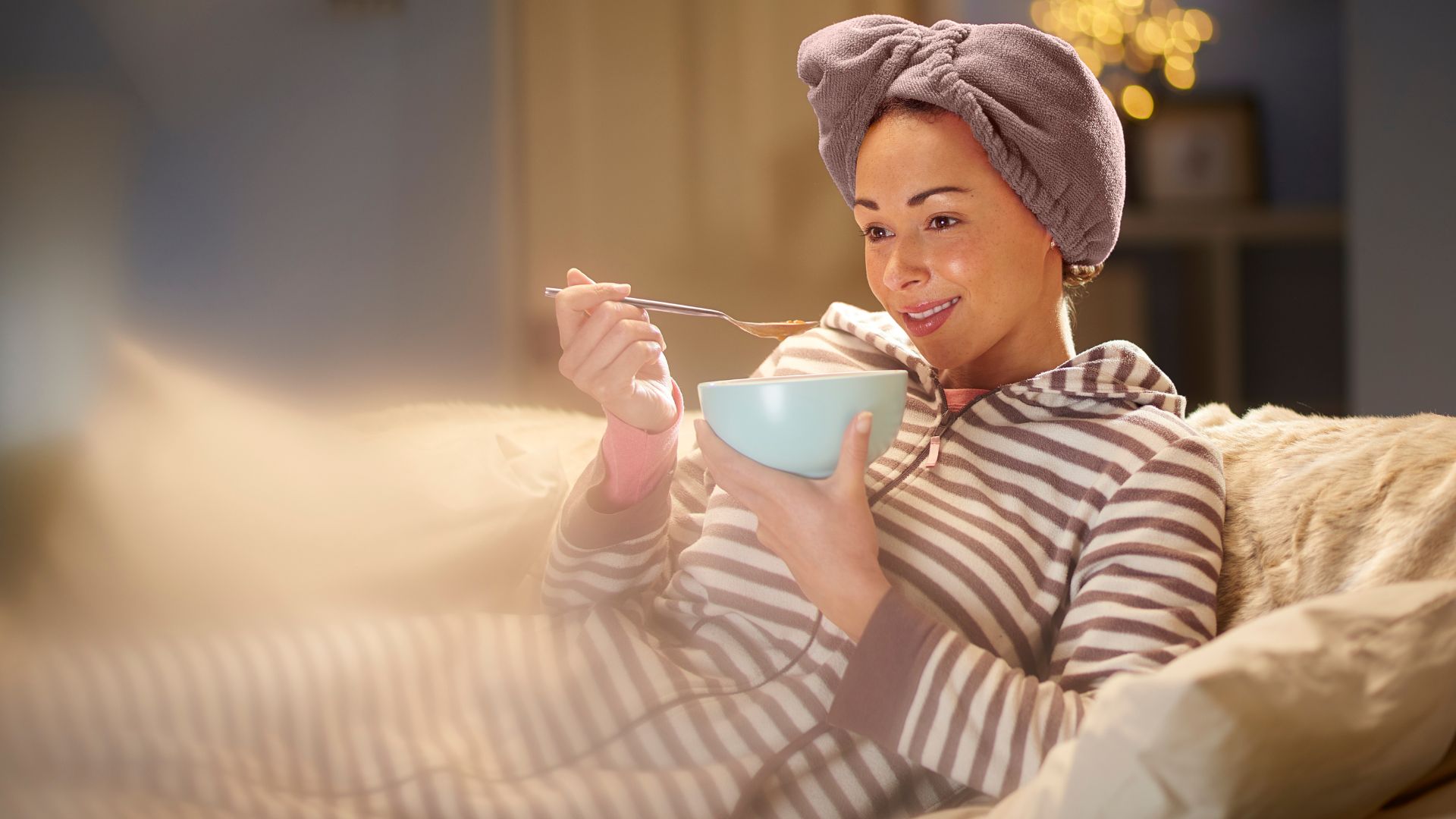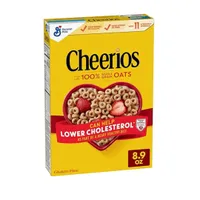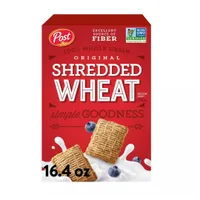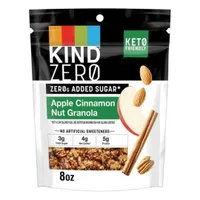Is eating cereal at night bad for your sleep? We ask a nutritionist
A nutritionist explains whether eating cereal before bed will help you sleep better

Here at Tom’s Guide our expert editors are committed to bringing you the best news, reviews and guides to help you stay informed and ahead of the curve!
You are now subscribed
Your newsletter sign-up was successful
Want to add more newsletters?

Daily (Mon-Sun)
Tom's Guide Daily
Sign up to get the latest updates on all of your favorite content! From cutting-edge tech news and the hottest streaming buzz to unbeatable deals on the best products and in-depth reviews, we’ve got you covered.

Weekly on Thursday
Tom's AI Guide
Be AI savvy with your weekly newsletter summing up all the biggest AI news you need to know. Plus, analysis from our AI editor and tips on how to use the latest AI tools!

Weekly on Friday
Tom's iGuide
Unlock the vast world of Apple news straight to your inbox. With coverage on everything from exciting product launches to essential software updates, this is your go-to source for the latest updates on all the best Apple content.

Weekly on Monday
Tom's Streaming Guide
Our weekly newsletter is expertly crafted to immerse you in the world of streaming. Stay updated on the latest releases and our top recommendations across your favorite streaming platforms.
Join the club
Get full access to premium articles, exclusive features and a growing list of member rewards.
While cereal is traditionally seen as breakfast food, it's likely that you've poured some into a bowl as a quick evening snack at the end of a long day. But is eating cereal at night good for your sleep?
Along with cutting down on caffeine and choosing the best mattress for your body, another sleep tip we've always recommended is ditching heavy evening meals for light, digestible dinners before bed. A bowl of cereal is certainly lighter than most meals, but does it mean that it can help you sleep better?
Following food makers pushing breakfast food as pre-bedtime snacks - and the CEO of Kellogg's controversial suggestion that cash-strapped families should eat cereal for dinner - we've asked nutritionist Jessica G. Anderson of Top Nutrition Coaching to discuss whether breakfast for dinner is actually good for you. Here's what we found out.
Can eating cereal before bed actually help you sleep better?
Anderson explains that a bowl of cereal can actually make a great pre-bedtime snack - as long as you choose the right one. "Cereal for dinner, when prepared strategically, can be a fantastic dinner and bedtime meal that can promote both health and sleep," says Anderson.
According to the nutritionist, the benefits of cereal for dinner stem from the fact that most cereals carry high glycemic index (GI). The higher the GI, the better it is at improving sleep onset latency (i.e. the length of time it takes you to fall asleep). High GI cereal triggers insulin production and increases the circulation of an amino acid called tryptophan. As levels of tryptophan in the blood begin to rise, it passes through the brain-blood-barrier.

"It is then converted to serotonin and melatonin, causing sleepiness and drowsiness," explains the nutritionist. "Thus, eating cereal for dinner or as a bedtime snack — 1 or 2 hours before bedtime — can improve sleep onset latency."
She also recommends eating smaller portions, as eating a small bowl of cereal shortly before bed is better than eating a large meal, which can take a longer amount of time to digest. "Eating mindfully has been shown to improve meal and snack satisfaction while moderating portion sizes," Anderson says. " When eaten in moderation and in combination with an overall healthy diet, eating cereal can be enjoyed with ease of mind. "
Get instant access to breaking news, the hottest reviews, great deals and helpful tips.
Here are Anderson's tips for preparing cereal for dinner:
- Use a smaller serving bowl
- Eat slowly
- Eat without distraction (turn off screens and remove the phone from your bedroom)
- Use all 5 senses to guide the eating experience (taste, smell, touch, hear and sight)
- Add a small serving of lean protein or healthy fats to your cereal, such as low-fat dairy, nuts, and seeds to stabilize blood sugars and enhance sleep quality.
And as you tuck into your bowl of cereal, consider dimming the lights to prepare your body for bed. We've looked into how light pollution can disrupt your sleep, and why you should aim to lower the lights in the hour before bed.
When is eating cereal at night bad for your sleep?
Before you go reaching for your favorite frosted cereal with the little marshmallows, however, you may want to check the box for the nutritional information.
"Not all cereals are created equally," warns Anderson. "Many cereals available on the market are more like a dessert; containing high loads of added sugars and little to no dietary fiber. The American Heart Association recommends limiting daily sugar intake to no more than 9tsp (32g or 150 calories) for males and 6tsp (25g or 100 calories) for females."
If you're planning on having a bowl of cereal for dinner tonight, Anderson advises considering whether the snack fits the following checklist:
- Contains 6g or less of added sugars per serving
- Contains less than 3g saturated fats per serving
- Contains at least 3g of fiber per serving

What are the best cereals to eat before bed?
Anderson encourages three nutrient-dense food groups before bed: starch or whole grains (found in most cereals), lean protein (such as Greek yogurt or skim milk), and a fruit and/or vegetable. "For the wholegrain group, consider a cereal that’s high in fiber, low-to-moderate in sugar," Anderson suggests.
Here are some of Anderson's favorite go-to cereals for evening snacking:
- Oatmeal prepared with nut butter, fruit, and low-fat milk or soy milk
- Low-sugar granola with dried fruit and low-fat or non-fat flavored Greek yogurt
- Cream of wheat prepared with low-fat milk or soy milk, sprinkled with fruit and of chia or flaxseed
5 nutritionist-approved cereals
Quaker Oats Low Sugar Oatmeal Variety Pack: from $6.98 at Walmart
A variety pack containing 20 sachets of lower sugar instant oatmeal, this snack can be prepared with soy milk or low-at milk and sprinkling with fruit, Anderson suggests.
General Mills Cheerios: from $3.68 at Amazon
This gluten-free cereal contains 100% whole grain oats and is a good source of calcium and fiber.
Post Shredded Wheat: from $3.99 at Target
The cereal, made from 100% whole grain wheat, is an excellent source of fiber.
Bear Naked Granola Cereal: from $4.49 at Walmart
With every serving containing 23g of whole grains, this low sugar granola is vegan and gluten-free. Anderson suggests topping it with dried fruit and low-fat or non-fat flavored Greek yogurt as a pre-bedtime snack.
KIND ZERO Added Sugar Nut Granola: from $6.27 at Walmart
With no gluten, dairy or added sugar, these granola clusters are made with nuts and seeds such as cashews and almonds.

Frances Daniels is a PPA-accredited journalist and Sleep Staff Writer at Tom's Guide with an MA in Magazine Journalism from Cardiff University. Her role includes covering mattress and sleep news and writing sleep product reviews and buyer's guides, including our Best Hybrid Mattress 2025 guide. She is interested in the relationship between sleep and health, interviewing an array of experts to create in-depth articles about topics such as nutrition, sleep disorders, sleep hygiene, and mattress care. She is also our specialist on mattress toppers — producing bed topper reviews and taking care of our Best Mattress Toppers 2025 guide — and leads content relating to fiberglass-free beds for a non-toxic sleep. Outside of Tom's Guide, she has written for Ideal Home and Marie Claire.
 Club Benefits
Club Benefits















